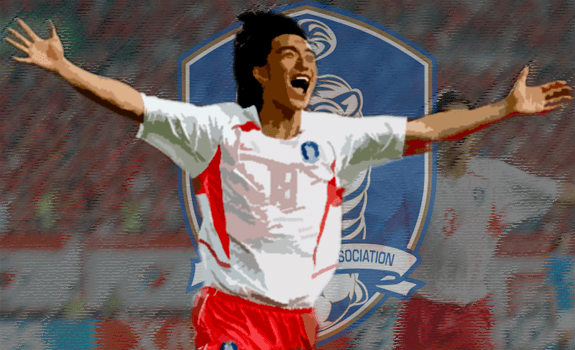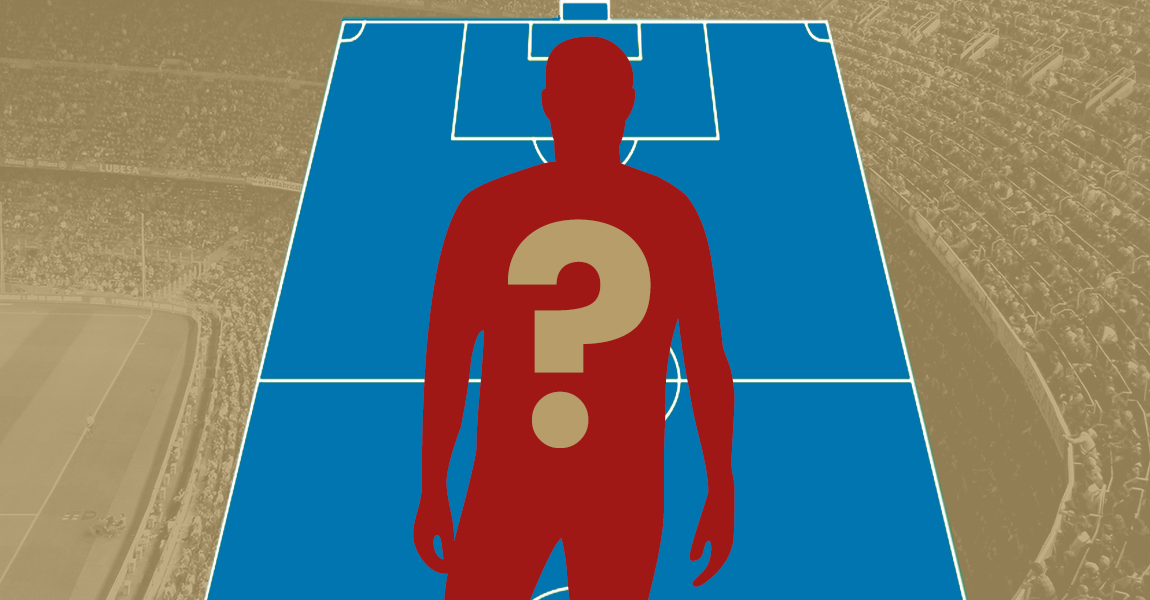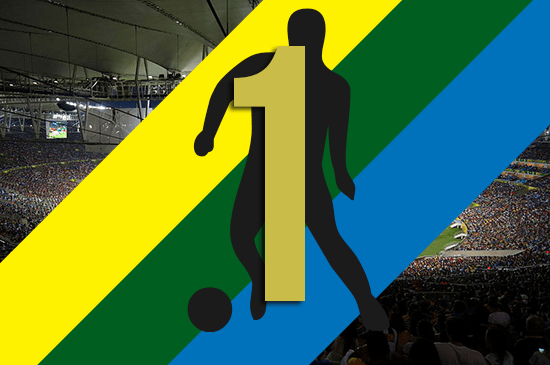
Hosting a World Cup is no small feat. And when South Korea and Japan beat out Mexico for the 2002 World Cup, there was immediate outrage. Japan had never even qualified for the tournament and South Korea had not performed well in their previous appearances, failing to advance from the group each time. Strong football nations, in particular certain European powerhouses, are not kind to newcomers and are often skeptical of these other teams as not “proper footballing nations.” So the pressure was on South Korea and Japan to make an impression in 2002 and as one of the few Asian footballers playing in Europe at the time, the pressure was also on attacking midfielder Ahn Jung-Hwan.
Ahn Jung-Hwan started his career with the Busan Daewoo Royals of the K-League. He had a fantastic beginning to his career in Korea and made 54 appearances scoring 27 goals for the club before moving on loan to AC Perugia, then a member of Serie A. In 2 seasons with Perugia he made 30 appearances and scored 5 goals before he took his break to join the South Korean National Team for the 2002 World Cup. Little did he know, he had played his last game ever for the club, but more on that later.
South Korea was drawn into Group D in the World Cup alongside Poland, Portugal and the United States. Guus Hiddink was making his World Cup debut with South Korea and their inaugural game was against Poland. Very few South Koreans dared to dream of a victory, let alone the glory that lay beyond the group stage. However, South Korea ran out 2-0 winners with Ahn Jung-Hwan coming on as a substitute in the 50th minute. It was South Korea’s first ever victory at a World Cup and it marked a change in fortunes for the Asian nation. In their second game of the group stage, the Koreans took on the United States, who were fresh off of a shock 3-2 win over Portugal. Ahn Jung-Hwan again came on as a substitute but this time he was able to make a huge impact by scoring a goal 12 minutes from full time to cancel out Clint Mathis’ opening goal and earn South Korea a draw. The Koreans then had their final game against Portugal and secured a huge 1-0 win with Ahn Jung-Hwan playing the entire 90 minutes and Park Ji-Sung scoring the lone goal. This win sent South Korea to the Knockout Stage as group winners and sent Portugal home, with the United States advancing at their expense. It was in the knockout stage that Ahn would make his largest impact.
Italy was the opponent for the co-hosts in the Round of 16 and South Korea were huge underdogs. Obviously a traditional power like Italy would roll over the surprise package from Asia. And things looked like they were headed that way when Christian Vieri opened the scoring for Italy in the 18th minute. The Italians continued to dominate for much of the game but were failing to find a clinching goal to put South Korea out for sure. And as can happen in football, their failure to put away the underdogs came back to bite them. With two minutes remaining in regular time, Seol Ki-Hyeon stepped up and scored a shocking equalizer. It was pandemonium and the South Koreans survived to force extra time. This was where Ahn Jung-Hwan became a legend.
13 minutes into the first extra period, Francesco Totti earned himself a 2nd yellow and a trip to the locker room. After going a man down, Italy was trying desperately to get to penalties and were frustrating every Korean attack. Then, with 3 minutes of the 120 remaining, Lee Young-Pyo collected the ball on the left wing and put in an early, hopeful cross towards Ahn. He leapt and got the faintest of touches to guide the ball just past Buffon and despite the Italian legend’s best efforts he could not keep it out. Ahn Jung-Hwan had scored a Golden Goal for South Korea and had sent them to the quarterfinals. They had beaten a giant and Ahn Jung-Hwan was responsible, or at least his parent club held him responsible.
The day after South Korea’s historic victory and Ahn Jung-Hwan’s historic winning goal, Perugia’s owner cancelled Ahn’s contract stating, “I have no intention of paying a salary to someone who has ruined Italian football.” He added that it was not due to the goal but due to comments that Ahn had made against the Italian nation. These were never confirmed. This was shocking from Perugia and Ahn was rightly incensed. The club eventually apologized but Ahn refused to play for them after their treatment of him. However, he still had a tournament to worry about.
In the Quarterfinals, Ahn Jung-Hwan scored a penalty against Spain as the co-hosts again shocked the world and advanced to the Semifinals. There they met Germany and that’s where the fairytale ended. Michael Ballack scored with 15 minutes left to keep South Korea out of the World Cup Finals. Ahn Jung-Hwan was still heralded as a South Korean hero and after the World Cup ended, he began looking for new employment.
Ahn returned to Asia following his Perugia snub to play football and had successful spells with the Shimizu S-Pulse and Yokohama Marinos of the J-League. He then returned to Europe and had short spells with FC Metz in France and MSV Duisburg in Germany. He then returned to the K-League where he finished his career.
Ahn Jung-Hwan is regarded as one of the best players to ever play for South Korea and helped pave the way for more Asian players to make an impact on European football. In the 2002 World Cup, he managed to become a national hero for his winning goal against Italy and managed to become a villain in the nation of his club team. Despite his villainy to the ownership of Perugia, he’ll always be remembered as the man that made a country dream of glory.
- Talent Radar: Bundesliga 10 Young Players (U-19) to Watch in 2016-17 - September 6, 2016
- Hipster Guide 2016-17: Middlesbrough’s tactics, key players, and emerging talents - August 11, 2016
- Im Herzen Vereint: The Incredible Story of Dynamo Dresden - July 13, 2016
























































